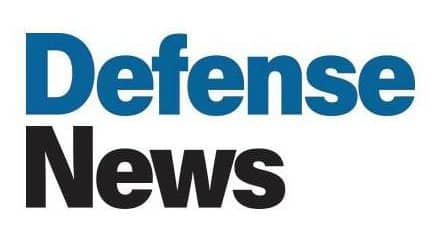Dr. Eran Lerman: Liberman’s views contradicted Netanyahu’s vision and that of the security establishment.
Defense News 21.11.2018

by Seth J. Frantzman
JERUSALEM — Israeli Defense Minister Avigdor Liberman’s Nov. 14 resignation disrupted the country’s politics at a sensitive time for regional security — and it could serve as the catalyst for the delay of several defense deals.
His resignation comes in the wake of a cease-fire with Hamas in the Gaza Strip and after several high-profile visits by Israeli Prime Minister Benjamin Netanyahu and his government ministers to Oman and the United Arab Emirates. Israel doesn’t have diplomatic relations with either state, but the Gulf countries are key to countering Iran and constructing a strategic concept in the region that dovetails with the current U.S. administration’s tough stance on Iran.
As for potential defense deals, any forthcoming announcement for the purchase of F-15 fighter jets to upgrade Israel’s aging fleet could be put off for the time being. The resignation could also impact a deal for a new fleet of helicopters, likely Boeing’s CH-47 Chinooks or Lockheed Martin/Sikorsky CH-53K King Stallions. And Israel had revived the idea of purchasing V-22 Ospreys. It’s now unclear how these potential deals, which could total $11 billion, will fare.
It was expected Liberman’s exit could also accelerate plans for early elections, but that fire seems to have been extinguished — at least into the new year. The most immediate effect of his departure is that Israel is without a dedicated defense minister; however, Netanyahu has taken on that portfolio for the time being.
As the largest recipient of U.S. security assistance, Israel receives $3.8 billion annually from America. Israel’s defense budget was $19.6 billion in 2017, and it is the seventh-largest global arms exporter, making stability at the helm of the Defense Ministry crucial to managing the U.S.-Israel security relationship.
Former U.S. Ambassador Daniel Shapiro, currently a fellow at the Institute for National Security Studies at Tel Aviv University, doesn’t see the vast majority of defense cooperation being affected by the ministerial change. “In terms of joint training, assistance, technology development and intelligence sharing, there won’t be any disruption whatsoever by a new defense minister or elections,” he said.
But it would be important for Israel that its new defense minister build a rapport with the U.S. defense secretary. Netanyahu’s takeover of Liberman’s post could make building a relationship with Pentagon head Jim Mattis difficult, Shapiro notes, as Netanyahu directly deals with the U.S. president.
Maj. Gen. Gershon Hacohen, a 42-year veteran of the Israel Defense Forces and currently at the Begin-Sadat Center for Strategic Studies, sees advantages to Netanyahu’s taking on another responsibility. “At the moment of critical decision-making, the one with the main responsibility is the prime minister and he must take the decision, and it is easier to do that when you are combining both duties,” he said.
Should Netanyahu look to replace Liberman with someone other than himself, he could choose a former general who shares his views on regional security, such as Yoav Galant, Benny Gantz or Gabi Ashkenazi, according to Brig. Gen. Avraham Benayahu, a former IDF spokesperson.
Liberman bristled at being corralled by Netanyahu and the security establishment, according to accounts from the last months before his resignation.
“I think it was not easy for Liberman to realize at the critical moment his opinion is not dominant amongst other opinions and not accepted by the prime minister,” Hacohen said, adding that it’s important for Netanyahu to make his expectations clear to the next defense minister.
“His views were different than the prime minister, he was less concerned than [Netanyahu] with our new regional posture,” said Eran Lerman, vice president of the Jerusalem Institute for Strategic Studies. A former deputy director for foreign policy and international affairs on Israel’s National Security Council, Lerman believes Liberman’s views contradicted Netanyahu’s vision and that of the security establishment, including Chief of Staff Gadi Eizenkot, Israel Security Agency (Shin Bet) head Nadav Argaman and Mossad chief Yossi Cohen. “That is a pretty dramatic situation for a defense minister to find himself.”
Lerman added that U.S.-Israel security cooperation — which includes a wide range of programs such as missile defense, counter-UAVs and anti-tunnel training — won’t be affected; although Liberman was quick to grasp the learning curve necessary to manage the Defense Ministry and work with the U.S., he was not a lynchpin of U.S.-Israel relations.
Industrial perspective
Israel’s largest defense companies — Rafael, Elbit and Israel Aerospace Industries — have been close-lipped on Liberman’s departure.
The Israeli defense industry is at a key juncture with Elbit’s acquisition of IMI that took place this month. After increasing exports by 40 percent in 2017 to $9.2 billion, the defense industry continues to grow. IAI signed $1.3 billion in contracts in India in October.
Liberman was not shy about communicating with private businesses. He claimed to have tamped down on companies sabotaging each other’s foreign deals. “I met with the heads of the defense industries and gave them a clear message about it,” he told business news outlet Globes this year.
The IDF is in the midst of a five-year plan, known as the Gideon Doctrine, which is meant to enable long-term planning and modernization, streamline the budgetary process, and avoid conflicts between the Defense and Finance ministries. The plan envisions a strategy to confront nonstate actors and strategic missile threats by using Israel’s advanced technological prowess.
Most of the programs associated with Gideon are expected to continue, such as the rolling out of the new eight-wheel drive Eitan armored personnel carrier.
“We can now state that within a decade, the IDF ground forces will undergo dramatic upgrading of its capabilities,” Liberman said in March. He had suggested Israel develop a new “missile corps,” but that pitch may now be in jeopardy. Announced with fanfare in February and again in August, his idea foresaw $145 million in financing precision-guided surface-to-surface missiles that could reach 150 kilometers.
What is safe, experts agree, are Israel’s ongoing programs with the U.S., including joint efforts on the Iron Dome, David’s Sling and Arrow 3 air defense systems, as well as counter-drone cooperation.
Defense News, 21.11.2018








 - בניית אתרים
- בניית אתרים